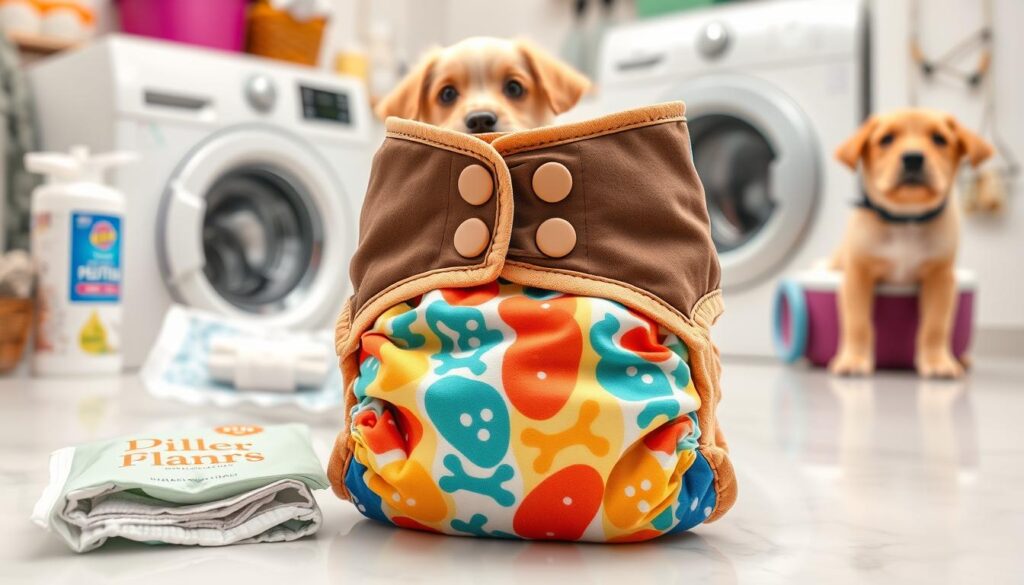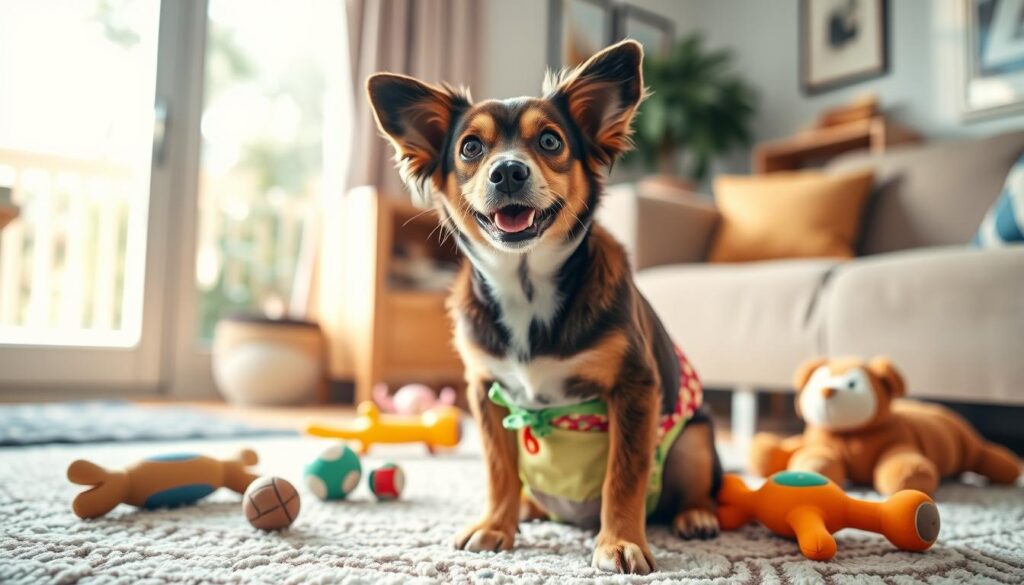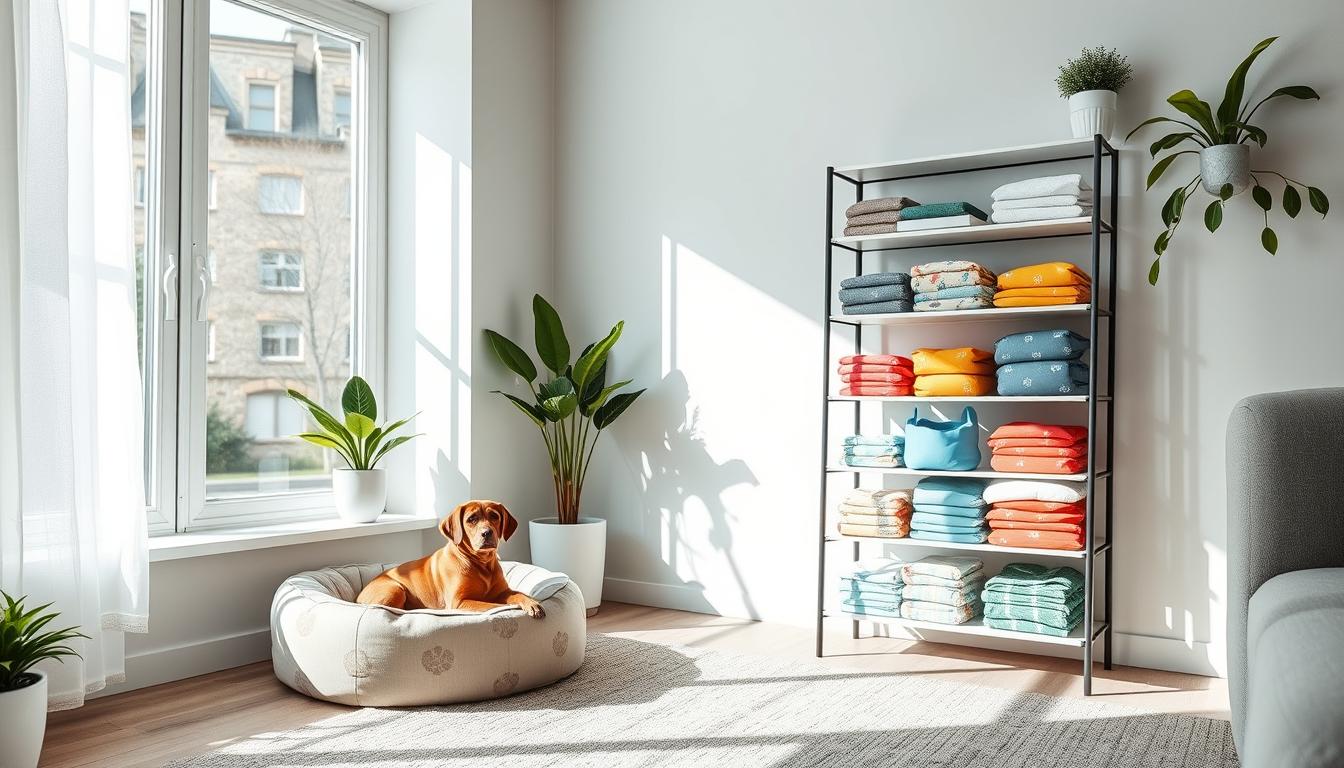As a devoted dog owner, you know how important a clean home is. Accidents and incontinence can mess up this balance. Dog diapers are here to help, keeping your pet comfy and mess-free.
Dog diapers handle many situations, like female heat cycles and post-surgery care. They’re also great for senior dogs or those with incontinence. With many types available, you can find the right fit for your pet.
Key Takeaways
- Dog diapers help maintain a clean and odor-free home environment by managing incontinence and other issues
- Diapers come in disposable and reusable options, as well as specialized designs for male and female dogs
- They can be used for a variety of situations, including heat cycles, post-surgery care, and senior dog care
- Proper fit and size are crucial for ensuring the effectiveness and comfort of dog diapers
- Maintaining good hygiene and training your dog to accept wearing diapers are important considerations
Understanding Dog Diapers: Types and Applications
Dog diapers are great for keeping your home clean and fresh. They come in many styles, each suited for different needs of dogs. Let’s look at the different types of dog diapers and how they are used.
Disposable vs. Reusable Options
There are disposable and reusable dog diapers. Disposable diapers are easy to use and absorb quickly. They’re good for quick clean-ups or accidents. Reusable diapers save money and are better for the environment because they can be washed and worn again.
Male vs. Female Diaper Designs
Choosing the right dog diaper depends on the dog’s gender. Male dog diapers fit the male body better, with special areas for absorption. Dog diapers for females cover the whole genital area, offering full protection.
Size and Fit Considerations
Finding the right fit is key for dog diapers to work well. Measure your dog’s waist and hips to pick the right size. Look for diapers with adjustable parts and stretchy materials for a snug fit that prevents leaks.
| Diaper Type | Key Features | Ideal for |
|---|---|---|
| Dog diapers male | Tailored fit, front-focused absorption | Male dogs, incontinence, marking |
| Dog diapers for females | Comprehensive coverage, rear-focused absorption | Female dogs, heat cycles, incontinence |
| Disposable diapers | Convenient, quick absorption | Short-term use, unexpected accidents |
| Reusable diapers | Sustainable, cost-effective | Long-term use, frequent incontinence |
Knowing about dog diapers helps pet owners keep their homes clean. It also ensures their dogs are comfortable and cared for.
Essential Benefits of Using Dog Diapers
Dog diapers are a great investment for you and your dog. They keep your home clean and hygienic. This is especially true for dog period diapers, diapers for dogs in heat, or managing dog period pads.
Dog diapers are great at controlling messes. They help when your dog is in heat or has incontinence. This keeps your home clean and prevents damage to your furniture and floors.
They also make life better for dogs with medical issues or age-related changes. For older dogs or those with incontinence, diapers offer comfort and security. They let dogs move freely without accidents. For female dogs in heat, diapers are discreet and prevent blood and discharge from spreading.
“Using dog diapers has been a game-changer for our household. It has allowed our senior pup to maintain her independence while keeping our home clean and odor-free.”
Dog diapers also strengthen your bond with your dog. They show you care about your dog’s comfort and well-being. This builds trust and affection in your relationship.
In summary, dog diapers have many benefits. They keep your home clean and improve your dog’s life. Whether it’s heat cycles, incontinence, or age-related issues, the right dog diapers can make a big difference.
Choosing Between Male Dog Belly Bands and Full Diapers
Managing male dog incontinence or urinary issues can be done in two ways: dog belly bands and full dog diapers. Knowing the differences between these can help you pick the right one for your dog.
How Belly Bands Work
Dog belly bands wrap around your dog’s midsection. They offer targeted coverage and absorption for minor leaks. These lightweight, discreet products are great for dogs with occasional accidents or during activities.
When to Use Each Type
- Use dog belly bands for mild, sporadic incontinence or extra protection in specific situations.
- Choose full dog diapers for more frequent or heavier accidents, or for all-day protection.
Material Considerations
Both belly bands for male dogs and full dog diapers come in various materials. Look for breathable, moisture-wicking fabrics to keep your dog dry and prevent skin irritation. Options include cotton, microfiber, and absorbent gels.
| Feature | Dog Belly Bands | Full Dog Diapers |
|---|---|---|
| Coverage | Targeted midsection | Full body |
| Absorption | Moderate | High |
| Convenience | Easy to put on and remove | May require more effort |
| Discretion | More discreet | More noticeable |
The choice between male dog belly bands and full dog diapers depends on your dog’s needs and your preferences. Think about how often you’ll use them, the level of absorption needed, and your dog’s comfort and mobility.
Female Dog Diapers for Heat Cycles and Incontinence
As pet owners, we face challenges with our female dogs’ heat cycles and incontinence. Female dog diapers are a practical solution. They keep our dogs clean and comfortable.
Dog diapers for females are made with female dogs in mind. They have absorbent materials and adjustable fits. This helps contain leaks during heat cycles. It keeps your home clean and your dog comfy.
Female dog diapers are also great for incontinent dogs. Incontinence is common in senior dogs or those with health issues. These diapers offer a discreet way to manage accidents, keeping your dog’s dignity intact.
| Feature | Benefit |
|---|---|
| Absorbent materials | Effectively contain leakage and odor during heat cycles and incontinence |
| Secure, adjustable fit | Ensures a comfortable and protective fit for your female dog |
| Discreet design | Allows your dog to move freely while maintaining their dignity |
Investing in female dog diapers shows you care about your dog’s comfort. With the right products, managing heat cycles and incontinence is easier. Your home stays clean and fresh.
How to Properly Measure Your Dog for the Right Fit
Finding the perfect fit for your dog’s diapers or belly bands is key for their comfort. It also makes the product work better. Whether you’re picking dog diapers or male dog belly bands, getting the measurements right is the first step. This ensures a snug and secure fit that keeps your furry friend happy and dry.
Sizing Guidelines
To find the right size, measure your dog’s waist and hips. Use a flexible tape measure and follow these steps:
- Waist: Wrap the tape measure around your dog’s waist, just behind the front legs.
- Hips: Measure around the widest part of your dog’s hips, usually just in front of the rear legs.
- Length: Measure from the base of your dog’s tail to the front of their chest.
Compare these measurements to the size chart from the diaper or belly band maker. This will help you find the best fit for your pup.
Common Fitting Mistakes to Avoid
- Choosing a size that’s too loose, which can lead to leaks and discomfort
- Selecting a size that’s too tight, which may restrict movement and cause irritation
- Failing to adjust the fasteners properly, resulting in a poor fit
Adjustment Tips
Once you have the right size, you might need to make small adjustments for a perfect fit. Try these tips:
- Fasten the diaper or belly band snugly, but not so tight that it restricts your dog’s movement.
- Check for any gaps or loose areas that could lead to leaks, and adjust the fasteners accordingly.
- Monitor your dog’s behavior and comfort level, making further adjustments if needed.
By measuring your dog and following these guidelines, you can find the right fit for their diapers or belly bands. This ensures their comfort and your peace of mind.
Maintaining Hygiene: Changing and Cleaning Dog Diapers
Keeping your dog’s dog diapers and dog belly bands clean is key for their comfort and health. This is especially true when they’re in heat. Regular changes and the right cleaning methods can stop skin problems and bad smells.
Frequency of Diaper Changes
Change your dog’s diaper every few hours or when it gets dirty. This keeps their skin dry and avoids skin issues. Watch how active your dog is, their size, and the diaper type to find the best change time.
Cleaning Reusable Diapers
For reusable dog diapers, always follow the maker’s cleaning guide. This usually means soaking in a mild detergent, rinsing well, and air-drying. Don’t use strong cleaners or hot drying, as it can harm the diaper.
Preventing Skin Irritation
- Gently clean your dog’s skin with a mild, fragrance-free wipe or cloth before putting on a fresh diaper.
- Apply a thin layer of a skin-soothing ointment or powder to help prevent redness and irritation.
- Monitor your dog’s skin for any signs of irritation, such as redness, rashes, or discomfort, and adjust the diaper fit or cleaning routine accordingly.
By following these hygiene tips, you can keep your dog’s dog diapers or dog belly bands clean and comfy. This is true whether you’re dealing with diapers for dogs in heat or other incontinence issues.

| Diaper Type | Recommended Change Frequency | Cleaning Method |
|---|---|---|
| Disposable dog diapers | Every 2-4 hours or when soiled | Discard and replace |
| Reusable dog diapers | Every 4-6 hours or when soiled | Soak in mild detergent, rinse, air-dry |
| Dog belly bands | Every 2-4 hours or when soiled | Spot clean or machine wash, air-dry |
Special Considerations for Senior Dogs and Puppies
As dogs get older or become puppies, their diaper needs change. Senior dogs might have trouble holding their bladder. Puppies are still learning to go potty outside. Knowing what they need is key to keeping your home clean and your pet happy.
Age-Specific Needs
Senior dogs often have trouble controlling their bladders. Dog diapers help keep your floors and furniture clean. They are also useful for senior dogs during their heat cycles, keeping things hygienic.
Puppies are learning to go potty outside. Dog belly bands can help catch accidents while you train them. This makes potty training easier.
Health Monitoring Tips
- Watch how often your senior dog uses diapers and notice any changes.
- Check your puppy’s diapers or belly bands for signs of irritation or discomfort.
- Talk to your vet if you see any unusual changes in your dog’s bathroom habits or health.
Understanding the needs of senior dogs and puppies helps keep them comfortable and your home clean. The right dog diapers and health checks make these challenges easier to handle.
Training Your Dog to Accept Wearing Diapers
Introducing dog diapers or belly bands for dogs can be a big change for your dog. But, with patience and positive rewards, they can get used to it. Follow some simple steps to make wearing dog period diapers easy for both you and your dog.
Start by letting your dog sniff and explore the diaper or belly band. Give them treats and praise when they show interest. Then, slowly put the diaper on them for a little while, increasing the time each day. Stay patient and positive, so your dog sees wearing it as a good thing.
- Introduce the diaper or belly band gradually, allowing your dog to get comfortable with the item.
- Use positive reinforcement, such as treats and praise, to create a positive association with wearing the diaper.
- Gradually increase the duration your dog wears the diaper, building up to longer periods over time.
- Be patient and consistent throughout the training process, as each dog may have a different learning curve.
Make the diaper or belly band as comfy as possible to help your dog adjust. Make sure it fits well but isn’t too tight. Use soft, breathable materials to avoid skin irritation. Give lots of praise, treats, and playtime while they wear it to make it a positive experience.
“The key to successfully training your dog to wear diapers or belly bands is to make the process a positive and rewarding experience. With patience and persistence, you can help your furry friend feel at ease and confident in their new attire.”
By using these tips, you can help your dog get used to wearing dog diapers, belly bands for dogs, or dog period diapers. With time and practice, they’ll learn to accept it. This will keep your home clean and comfortable for both of you.

Preventing Leaks and Managing Accidents
Keeping your dog’s diaper in place is key to avoid messy leaks. If the diaper shifts or bunches, adjust the fit or try a belly band. Make sure the diaper fits your dog right. With the right fit and patience, you can cut down on accidents.
Troubleshooting Common Issues
Leaks can happen if the diaper isn’t secure or gets too wet. If you see leaks, adjust the fit or change the diaper. Also, watch for skin irritation, as it can cause leaks. Keeping your dog’s skin clean and dry is vital for a good diaper routine.
Emergency Solutions
Even with the best plans, accidents can still occur. Have cleaning supplies ready, like pet-safe wipes and paper towels. Consider a belly band or extra diaper for outings or during heat cycles. With quick action and preparation, you can handle any unexpected mess.

